Suchergebnisse
GLASGrün - Regulierung von Klima, Energiebedarf und Wohlbefinden in GLASverbauten durch bautechnisch integriertes, vertikales GRÜN
Entwicklung von vertikalen Vegetationssystemen zur sommergrünen Vorverschattung von Glasfassaden des Lebensmittelhandels und Gewerbeflächen. GLASGrün generiert quantitative Daten zu Energie- und Mikroklimahaushalt und qualitative Daten zur Wahrnehmung von Nutzer:innen. Das Ergebnis sind Leitfäden zu skalier- und übertragbaren konstruktiven Lösungen mit Pflege- und Managementplänen.
Reallabor Weizplus: Der Bezirk Weiz wird zum Reallabor für die Energiewende
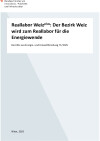
Klärung relevanter Fragen für die potenzielle Errichtung eines Reallabors in der Region Weizplus, das eine 100% Versorgung der Region mit Erneuerbaren Energien bis 2030 zum Ziel hat. Der inhaltlich-technologische Fokus der Aktivitäten des zukünftigen Reallabors liegt auf allen energierelevanten Sektoren (Wärme, Strom, Kälte) angewandt auf die Schwerpunkte Energieeffizienz und Ersatz fossiler Energie in Gebäuden, in Gewerbe und Industrie sowie Mobilität.
Schriftenreihe
71/2025
Barbara Hammerl, Iris Pierer, Hans Schnitzer, Katharina Schwarz, Gosia Stawecka, Christoph Brunner, Christian Fink, Joachim Kelz, Ingo Leusbrock, Michael Salzmann, Ewald Selvicka, Bernhard Puttinger, Markus Simbürger, Lorenz Artaker, Winfried Braumann, Elisa Garzon, Georg Martischnig, Edgar Rosenmayr, Mafalda Soto, Rafael Bramreiter, Harald Messner, Christian Sakulin
Herausgeber: BMIMI
Deutsch, 29 Seiten
Downloads zur Publikation
Virtual-Reality-gestützte Energiedienstleistungen für intelligente Energiesysteme (Beyond)
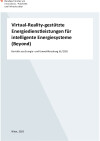
Das Projekt "Beyond" behandelte zwei unterschiedliche Energiedienstleistungen durch das Zusammenspiel verschiedener Technologien: hochmoderne virtuelle Realität (VR), das Internet der Dinge (IoT), Energiesimulation und maschinelles Lernen (ML). Der Energiedienstleistung 1 versetzt VR-Nutzer durch ein lehrreiches VR-Spiel in energieeffizientes und nachhaltiges Gebäudedesign, während der Energiedienstleistung 2 die Instandhaltung von Gebäudesystemen, insbesondere eines Heizung, Lüftung und Klimaanlage (HLK)-Systems, durch die Anwendung von ML-Modellen für vorausschauende Wartung verbessert.
Schriftenreihe
61/2025
Christina J. Hopfe, Matej Gustin, Robert S. McLeod, Johanna Pirker, Saeed Safikhani, Georg Arbesser-Rastburg, Gerald Schweiger
Herausgeber: BMIMI
Deutsch, 50 Seiten
Downloads zur Publikation
Partizipativer Klima-Transformationsfahrplan als Basis für ein Demo-Quartier im gas-versorgten Kahlenbergerdorf (Die Wärmepioniere)
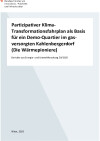
Entwicklung eines Transformationsfahrplans zur Dekarbonisierung eines Quartiers und dessen Umsetzung in einem Teilgebiet sowie Akzeptanzsicherung des Projektes und Bewusstseinsbildung durch einen aktiven Partizipationsprozess der Bevölkerung und der Gründung einer Energiegemeinschaft zur Wärmeversorgung.
Schriftenreihe
59/2025
Gerhard Hofer, Katharina Schlager, Alina Stipsits, Sama Schoisengeier, Johanna Jicha, Matthias Tuzar, Gernot Tscherteu, Micha Schober, Julia Jesella, Hans Binder, Andreas van Egmond-Fröhlich
Herausgeber: BMIMI
Deutsch, 111 Seiten
Downloads zur Publikation
ReallaborWaldviertel: 100% erneuerbares Waldviertel
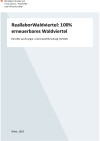
Unter dem Motto „Immer einen Schritt voraus“ ist das Ziel die Entwicklung eines inhaltlichen und wirtschaftlichen Umsetzungskonzepts für ein „Reallabor 100% erneuerbare Energie Waldviertel“.
Schriftenreihe
70/2025
Martin Holper, Bettina Frantes, Frederike Ettwein, Hannes Schiestl, Michael Schmidthaler, Franz Tyma
Herausgeber: BMIMI
Deutsch, 75 Seiten
Downloads zur Publikation
GLASGrün: Regulierung von Klima, Energiebedarf und Wohlbefinden in Glasverbauten durch bautechnisch integriertes, vertikales Grün
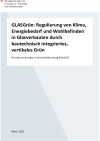
Entwicklung von vertikalen Vegetationssystemen zur sommergrünen Vorverschattung von Glasfassaden des Lebensmittelhandels und Gewerbeflächen. GLASGrün generiert quantitative Daten zu Energie- und Mikroklimahaushalt und qualitative Daten zur Wahrnehmung von Nutzer:innen. Das Ergebnis sind Leitfäden zu skalier- und übertragbaren konstruktiven Lösungen mit Pflege- und Managementplänen.
Schriftenreihe
60/2025
Rosemarie Stangl, Anna Briefer, Maximilian Poiss, Thomas Wultsch, Bernhard Scharf, Ulrike Pitha, Barbara Smetschka, Juliane Wang, Willi Haas, André Sebastian Baumgart, Rudolf Bintinger, Bernhard Lipp, Gerhard Huber, Susanna Wagner, Katharina Mauss, Susanne Formanek, Martin Auer, Leo Obkircher, Jerome Posch
Herausgeber: BMIMI
Deutsch, 240 Seiten
Downloads zur Publikation
Erkennung von Personen und Gruppen in bestehenden Gebäuden auf Basis von sichtbarem Licht (Vilipa)
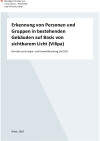
Evaluierung der technischen und wirtschaftlichen Machbarkeit eines Belegungserkennungssystems basierend auf der Technologie des Visible-Light-Sensings, das in Kombination mit der Gebäudeleittechnik den Energieverbrauch von Gebäuden senken soll. Ziel ist es low-tech/low–complexity Lösungen zu realisieren, die allein durch die Erfassung der Reflexionen des sichtbaren Lichts zwischen einzelnen Personen und Gruppen unterscheiden können.
Schriftenreihe
58/2025
Andreas Peter Weiss, Omar El-Ouahabi, Christian Fragner, Pirmin Pezzei, Hristo Ivanov, Pasha Bekhrad, Yingjie Liu, Erich Leitgeb
Herausgeber: BMIMI
Deutsch, 39 Seiten
Downloads zur Publikation
Reallabor Weizplus - Reallabor climate-neutral region Weizplus
Clarification of relevant questions for the potential establishment of a real lab in the region of Weizplus, which aims at a 100% supply of the region with renewable energies by 2030. The content-related technological focus of the activities of the future real lab is on all energy-relevant sectors (heating, electricity, cooling) applied to the focal points of energy efficiency and replacement of fossil energy in buildings, in trade and industry as well as mobility.
NutOpIA Klagenfurt - Optimisation of indoor and outdoor use in Klagenfurt
The NutOpIA Klagenfurt project aims to drive the transformation to a climate-neutral city forward by optimising the use of spaces and areas both internally and externally.
Climate-School-Life - Preparation of the climate-neutral educational campus in Gratwein-Straßengel
The project aims to start the transformation process of the educational campus of the market town of Gratwein-Straßengel into climate-neutrality. The need for the expansion and modernisation of the elementary school forms the central part of this development. The project provides an integrated district concept for the four central infrastructure topics of the project: urban development, architecture, mobility and energy. Participation processes of the population and innovative financing models are further components of the exploration.
FROSCHBERG 2.0 - Designing existing neighborhood(s) to be renewable and replicable
Exploration of replicable solutions for the socially acceptable transformation of existing neighbourhoods towards climate neutrality using the example of the Froschberg workers' housing estate. The result, the presentation and integration of climate neutrality into the refurbishment roadmap for the Froschberg workers' housing estate, serves as a starting point for implementation in a follow-up project.
Climate Quarter Melk
Radical and comprehensive transformation of a city quarter in the small town of Melk, Lower Austria, involving the areas of urban planning, landscape architecture, traffic planning and co-creation - demonstrated by the implementation and rededication of a parking lot to an urban, inner-city climate forest within project life-time.
Klimagärten³ - Biodiverse, CO2-saving, close to nature: climate gardens³ for Austria's garden future
The Klimagärten³ project is dedicated to the climate-friendly design of gardens and green spaces in Austria. The focus is on activating the previously untapped climate protection potential of private and public gardens. Through research, practical trialling and social networking, ways are shown in which gardens can act as CO₂ sinks and strengthen biodiversity.
KlimaQuartierNikolai
The project aims to improve sustainable energy supply and energy efficiency for the planned NikolaiQuartier in Villach by utilizing waste heat and local energy sources. An innovative energy concept, which also includes the regional hospital, is being developed. Active involvement of residents and stakeholders is key to securing acceptance of the eco-friendly neighbourhood.
SAFE - Creating a safe school environment together
Tactical urbanism for the temporary redesign of school surroundings to reorganize school mobility in a participatory process. The resulting catalogue of measures will serve as a blueprint for an implementation at other schools in Austria.
PersonAI - User-Centered AI-based energy services built on personal preference models
Conduct a large-scale, long-term study with 40-50 people to create personal comfort profiles to increase comfort in buildings. The personal comfort profiles will then be fed back into the building control system as input variables in a proof-of-concept.
KliB40-Klimakompass: Klimaneutrales Bregenz 2040, Klimakompass zur strukturierten Beteiligung von Stakeholdern und Bevölkerung
Der "KliB40-Klimakompass" unterstützt Bregenz auf dem Weg zur Klimaneutralität 2040, erleichtert die Koordination von Klimaschutzaktivitäten und bindet Stakeholder aktiv ein. Durch die Evaluierung bestehender Softwarelösungen wird eine optimale digitale Unterstützung für die Planung und Umsetzung der Klimastrategie sichergestellt.
ECO-Transformation - Energietransformation durch Community-Building, Suffizienz und serielle Lösungen am Beispiel des "Cottage Viertels"
Vernetzung technischer und umweltpsychologischer Expertisen zur Entwicklung eines Transformationsprozesses hin zum klimaneutralen Quartier auf Basis der Methoden Community Building, Suffizienzpotenziale sowie seriell anwendbare Umsetzungslösungen anhand des Beispiels Cottage Viertel. Vorbereitung der seriellen Umsetzung der entwickelten Lösungen und des Transformationsprozesses.
MADOKLI - Mannersdorf wird klimafit! Nutzung lokaler Ressourcen zur Klimawandelbekämpfung und -anpassung für ein klimaneutrales Quartier
Das Projekt zielt darauf ab, in der Stadtgemeinde Mannersdorf am Leithagebirge ein klimaneutrales Quartier zu entwickeln, indem innovative Maßnahmen zur Klimawandelanpassung und Dekarbonisierung kombiniert werden.
MEIDLINGER L Demo
Anhand des MEIDLINGER L modulares Rankregals soll ein flächendeckender Einsatz von Fassadenbegrünungen im urbanen Bestand ermöglicht werden. In Kombination mit thermischer Sanierung von Bestandsgebäuden sowie Begrünung, Photovoltaik, Wassermanagement, Umnutzung des Straßenraums und Mobilität mit der Integrierung resilienter Energieinfrastruktur sowie der Anwendung eines maßgeschneiderten Finanzierungsmodells sowie eines Dienstleistungsangebots zur Multiplizierbarkeit.
